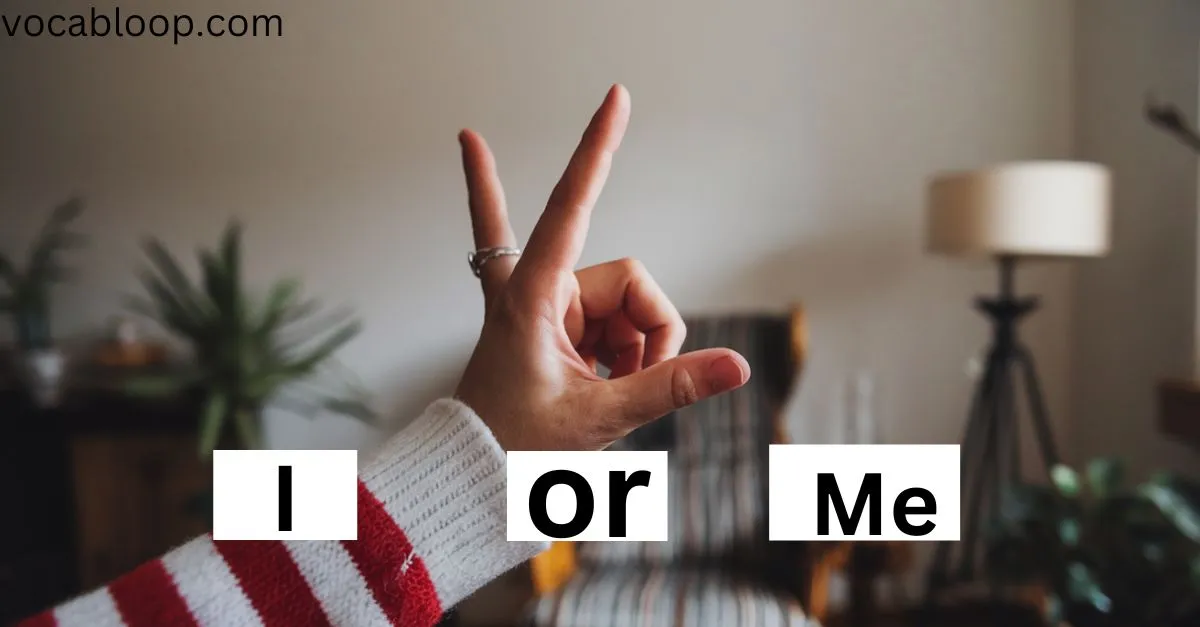The difference between “I” or “me” often causes confusion, even among native English speakers. Both are personal pronouns, but they serve different roles in sentences. “I” is used as the subject pronoun, referring to the person performing the action of a verb. On the other hand, “me” is an object pronoun, used when the person is the receiver of the action.
Understanding the distinction between these two pronouns is crucial for constructing grammatically correct sentences. In this article, we will break down the rules, explain when to use “I” and “me,” and offer tips to avoid common mistakes, ensuring you make the correct pronoun choice every time.
What Confusion Is There I or Me?

“I” and “me” are both personal pronouns, but they are used in different situations. This can confuse many people, especially when they are speaking or writing quickly.
The problem comes when people use the wrong pronoun in places where grammar rules should apply. It is crucial to use “I” as a subject pronoun and “me” as an object pronoun.
Is the I Word Correct?
Yes, “I” is a correct pronoun choice when it is used as the subject of a sentence. A subject pronoun represents the person performing the action of the verb. For example, in the sentence “I went to the store,” the pronoun “I” is the subject of the verb. “I” is always used when you are talking about yourself doing the action.
Definition:
“I” is a subject pronoun that replaces the name of the person performing the action in a sentence. For instance, instead of saying “John went to the store,” you can say “I went to the store.”
Meaning:
“I” refers to the speaker in the sentence. It indicates the person who is acting, performing, or involved in the action of the verb.
Usage:
“I” is used when the pronoun is the subject of the verb. For example:
- “I am going to the market.”
- “I love reading books.”
Is the Me Word Correct?
The word “me” is also a correct pronoun choice, but it is used differently. “Me” is an object pronoun. It is used when the pronoun is receiving the action of the verb or when it follows a preposition.
Definition:
“Me” is an object pronoun that replaces a noun as the object of a verb or preposition. For example, in the sentence “She gave the book to me,” “me” is the object of the preposition “to.”
Meaning:
“Me” refers to the speaker as the one receiving the action. It’s used when you are the recipient or target of the action of the verb or a preposition.
Usage:
“Me” is used when the pronoun is the object of a verb or a preposition. For example:
- “She called me.”
- “Can you help me with my homework?”
Quick Summary
| Pronoun | Role | Usage Example |
| I | Subject pronoun | I went to the store. (I am performing the action) |
| Me | Object pronoun | He gave me the book. (I am receiving the action) |
I or Me as Parts of Speech
“I” and “me” are both personal pronouns, but they serve different roles in sentences. “I” is used as the subject of a verb, indicating the person performing the action. For example, in the sentence “I went to the store,” “I” is the subject of the verb “went.”
On the other hand, “me” is used as the object of a verb or preposition, referring to the person receiving the action. For instance, in “She called me,” “me” is the object of the verb “called.” Understanding these roles is key to correct usage.
Pronunciation of I or Me

The pronunciation of “I” and “me” is very similar but distinct. “I” is pronounced like the letter “I” (/aɪ/), while “me” is pronounced with a softer sound (/miː/).
While the two may sound similar in everyday speech, it’s essential to distinguish them based on their sentence roles.
Side-by-Side Comparison I or Me
| Pronoun | Role in Sentence | Example Sentence |
| I | Subject of a verb | I am going to the store. |
| Me | Object of a verb | She gave me a gift. |
| I | Subject of a verb | I will finish the work tomorrow. |
| Me | Object of a preposition | She sat next to me. |
Which One is More Acceptable I or Me?
“I” vs “Me” are acceptable in different contexts, but correct pronoun usage depends on the sentence structure. “I” should be used as the subject of a verb, and “me” should be used as the object. Using “I” in the wrong position, such as saying “She gave it to I,” is grammatically incorrect.
I in British English and American English
In both British English and American English, “I” is used in the same way as a subject pronoun. There is no major difference in how “I” is used in these two varieties of English. However, there are subtle differences in other aspects of grammar and pronoun usage, but not in the use of “I.”
Me in British English and American English
“Me” is used in both British English and American English as an object pronoun. The key rule to remember is that “me” is used as the object of a verb or preposition, no matter the variety of English being spoken. For instance, you would still say “She gave it to me” in both British and American English.
Common Mistakes and How to Avoid Them
One of the most common mistakes is using “I” when “me” is needed. For example, saying “She gave the book to I” is incorrect. The correct form is “She gave the book to me” because “me” is the object of the preposition “to.”
To avoid such mistakes, remember that “I” is used as the subject of the verb (the one performing the action), while “me” is used when you are the object (receiving the action). Always check whether the pronoun is doing the action or receiving it.
Trick to Remember the Difference I or Me
Here’s a simple trick: When in doubt, remove the other person from the sentence. For example, in “John and I went to the park,” remove “John and” and see if the sentence still makes sense: “I went to the park.”
This confirms that “I” is correct. Similarly, in “She gave it to John and me,” remove “John and” and the sentence becomes “She gave it to me,” confirming that “me” is correct.
Origins of I or Me

The origins of “I” and “me” are rooted in the Old English language. “I” comes from the Old English word “ic,” which was used as a subject pronoun. Over time, it evolved into the modern form “I.” The word “me” comes from the Old English “mē,” which was used as an object pronoun.
“I” has been used as a subject pronoun since Old English, and it continues to be one of the most essential pronouns in the language.”Me” also comes from Old English, used as an object pronoun. Its usage has remained consistent throughout the evolution of the English language.
Synonyms of I or Me
I
- We
- You
- They
- Myself
- One
- The speaker
- The writer
- Yours truly
- The undersigned
- This writer
Me
- Us
- Them
- You
- Myself
- Me and others
- The speaker
- The writer
- This person
- Myself
- Me too
Sentences in Daily Usage of I or Me
I:
- I am going to the movies tonight.
- I need help with my homework.
- I can’t wait for the weekend.
- I saw that movie last week.
- I want to go for a walk after lunch.
- I have a meeting tomorrow.
- I forgot to call my friend.
- I think I left my keys at home.
- I enjoy reading books.
- I’ll take care of the bills.
Me:
- She called me yesterday.
- Can you help me with this problem?
- He gave me a gift for my birthday.
- She sat next to me in class.
- He told me to be careful.
- The teacher asked me to stay after school.
- They showed me the way.
- Please give me a call when you arrive.
- I haven’t seen you in years; it’s so good to see me.
- She handed me the report.
FAQs
Why is “me” used instead of “I”?
“Me” is used when it is the object of a verb or preposition. “I” is used as the subject of a verb.
Can you say “John and I went to the store”?
Yes, because “I” is the subject pronoun here.
What is the rule for “I” and “me”?
“I” is for the subject of a sentence, and “me” is for the object of a sentence or preposition.
Is “me and John went to the store” correct?
No, the correct form is “John and I went to the store.”
How can I avoid confusing “I” and “me”?
Always check if the pronoun is performing the action (use “I”) or receiving it (use “me”).
Conclusion
Understanding the difference between “I” and “me” is crucial for correct pronoun usage and effective communication. By knowing when to use subject pronouns and **object
pronouns, you can speak and write more clearly. Remember, “I” is for the subject of the sentence, and “me” is for the object**. By following these simple rules, you’ll avoid common mistakes and improve your grammar.

Alex Hormozi is a seasoned blogger at Vocab Loop, known for his deep insights into language, vocabulary, and grammar. With years of experience in writing, Alex shares practical tips and effective strategies to help readers improve their linguistic skills and enhance their writing abilities.

